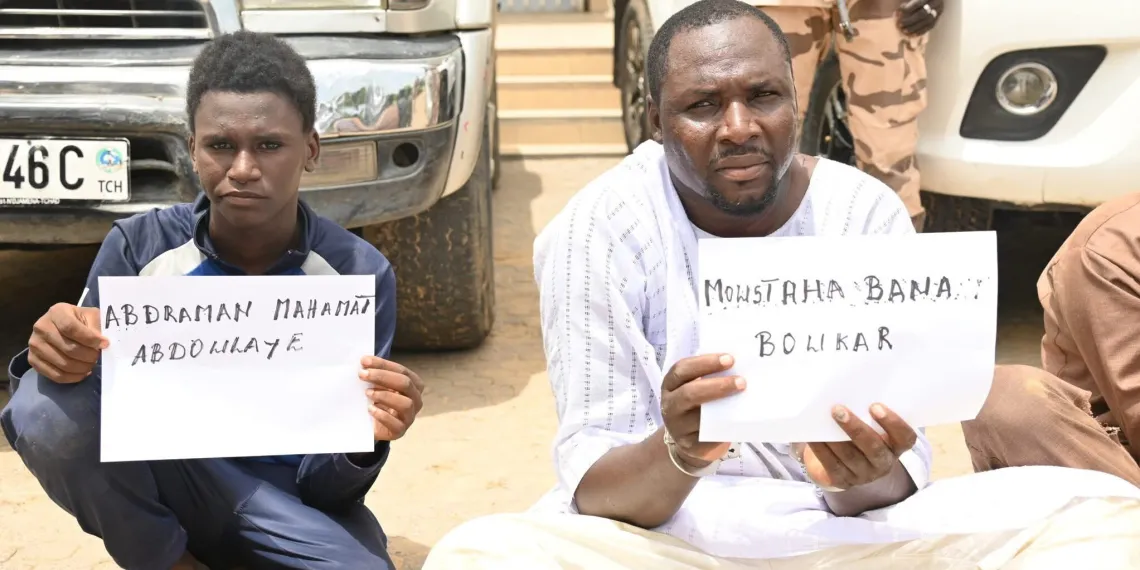Muslim Yusuf, a son of Boko Haram’s late founder, Mohammed Yusuf, has been arrested in Chad, where he allegedly led a jihadist cell.
According to multiple reports, the teenage son of the late founder was born in Nigeria before the 2009 uprising, groomed into militancy, and had begun to carve out his own cell to prove his worth within ISWAP.
A source said he was attempting to establish a new base in the Lake Chad region when he was arrested.
His true identity was reportedly revealed to the Chadian authorities following a tip-off from Nigerian intelligence.
It was gathered that the suspect had initially disguised as Mustapha Bana Abubakar when he was captured alongside five others.
According to AFP, Muslim Mohammed Yusuf was detained alongside five suspected members of the Islamist movement.
Chadian police had earlier confirmed the arrest of six suspected members of Boko Haram but declined to identify them. It was only after Nigerian intelligence alerted N’Djamena through the Multinational Joint Task Force (MNJTF) that authorities realised one of the suspects was the son of Boko Haram’s founder.
Zagazola Makama reported that the wanted terrorist was captured alongside five others including, Hassan Abdurrahman, suspected logistics aide, Abubakar Mohammed, alleged cell recruiter, Abubakar Ali Madou, believed to be in charge of weapons and mobility and Abdurrahman Mohammed Abdallah, a minor, suspected to have participated in operations.
A Nigerian intelligence source in the Lake Chad region said the group belonged to the Islamic State West Africa Province (ISWAP), a breakaway faction that split from Boko Haram in 2016 over ideological differences.
“The team was headed by Muslim, the youngest son of the late Boko Haram founder,” the source told AFP, adding that Yusuf was just 18 and had been an infant when his father was killed in a Nigerian military crackdown in 2009 that left around 800 people dead.
Photographs obtained by AFP after the arrests appeared to show a slight young man in a blue tracksuit, resembling Yusuf, standing alongside older men. He is also said to go by the alias Abdrahman Mahamat Abdoulaye and is the younger brother of ISWAP leader Habib Yusuf, also known as Abu Mus’ab al-Barnawi.
A former Boko Haram lieutenant, who has since renounced the group but retains knowledge of its leadership, confirmed Mr Yusuf’s arrest. “He and the team were arrested by Chadian security. They are six in number,” he said.
Chadian police spokesperson Paul Manga described the suspects as “bandits who operate in the city … they are undocumented, they are members of Boko Haram,” adding that the arrests took place “a few months ago”.
The Islamist group has terrorised communities around the Lake Chad basin for 15 years, killing tens of thousands and displacing millions. In recent months, it has staged increasingly bold attacks on villages and military positions in Nigeria, Chad, Cameroon and Niger.
The arrest comes as Nigerian authorities also confirmed the capture of two top leaders of the Ansaru faction – Mahmud Muhammad Usman, also known as Abu Bara’a, and Mahmud al-Nigeri, known as Mallam Mamuda.
The United States and the United Kingdom hailed the twin breakthroughs as “a significant step forward” in the fight against terrorism, Arise TV reported.
In a statement on X (formerly Twitter), the US Embassy in Abuja described the captures as “a significant forward step in Nigeria’s fight against terrorism,” while the British High Commissioner to Nigeria, Richard Montgomery, hailed them as “an extraordinary and very significant success.”
Mohammed Yusuf, founder of Boko Haram, was captured by the Nigerian military and later executed in police custody in Maiduguri on 30 July, 2009. His death triggered a violent insurgency that has since spread across Nigeria and the Lake Chad Basin.
His older son, Habib Yusuf, later became leader of ISWAP, the faction that broke away from Boko Haram. Abdrahman, the younger son, is believed to have been groomed to continue the family’s militant legacy.
For security analysts, the arrest of Yusuf carries outsized symbolic weight. Speaking to Arise TV, Bashir Uji, a terrorism expert, warned that while the capture dealt a blow to jihadist networks, “the groups still retain the capacity to regroup and retaliate.”
Daily Trust also reported that Mr Yusuf’s detention could prove “a major symbolic victory” for counter-insurgency efforts in the region. The newspaper cited security experts, including a former director of the Department of State Services, Mike Ejiofor, who urged Chad to repatriate Yusuf to Nigeria “so that he would be a big asset for our security agencies in terms of investigation.”
The developments come as Washington introduced new security rules requiring Nigerian visa applicants to provide five years of social media handles, phone numbers and email addresses. US officials said the move was designed to tighten screening against individuals with possible extremist links.
Nigerian military authorities have previously disclosed that more than 14,000 terrorists and criminals have been arrested over the past two years, with hundreds of weapons and thousands of rounds of ammunition recovered.
Analysts however noted that the country faces a daunting challenge in translating battlefield gains into lasting security. Nigeria’s congested prisons remain vulnerable to mass jailbreaks, while prosecution of captured insurgents often drags on for years. Unless the state can secure convictions and prevent escapes, experts warn that high-profile arrests such as Yusuf’s may not deliver the decisive blow that communities in the north-east have long hoped for.

